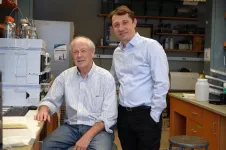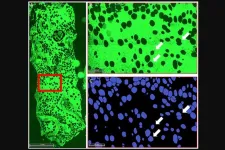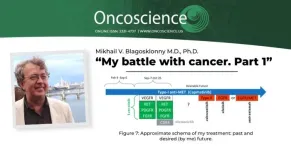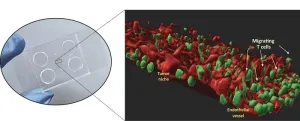(Press-News.org) Researchers performed a meta-analysis of randomized trial studies that compared the use of amyloid-reducing monoclonal antibodies (MABs) in patients with Alzheimer dementia at a dose consistent with that used in Phase 3 or FDA approval trials with the use of a placebo. Their purpose was to evaluate clinically meaningful benefits and harms of MABs to these patients. For inclusion in this meta-analysis, the RCT studies had to include adult participants with cognitive impairment or Alzheimer disease of any severity and report at least one clinically relevant benefit or harm to participants after at least one year. The research team identified 19 such publications that evaluated the effects of 8 different MABs on a total of 23,202 participants. Neither the results of any single study nor the results of all combined studies showed quantitative evidence that MABs improved cognitive or day-to-day functional abilities beyond the measure of minimal clinically important differences (MCIDs). Conversely, the studies indicated that MABs consistently cause statistically significant harms and could increase patients’ risk of serious harms such as cerebral edema, hemorrhage, serious adverse events, and death. Additionally, these drugs are prohibitively expensive ($26,500 to $28,200 per year) and require regular MRI monitoring.
What We Know: The theory that amyloid deposition is part of the causal pathway in the development of Alzheimer dementia has led to the development of MABs to reduce amyloid deposition. FDA approval of these drugs was based primarily on improvements to laboratory measures such as medical imaging and biomarkers. However, the failure of MABs to provide clinically significant improvement in patient-oriented outcomes such as reduced mortality or morbidity has resulted in controversy. Previous systematic reviews evaluating the efficacy and harms of using MABs to target amyloid did not include recent studies that were critical to drug approval, and some included Phase 1 and 2 trials that used different doses from those used in later trials and did not interpret the findings in the context of minimal clinically important differences for patient outcomes.
What This Study Adds: Although lab-based evidence shows that MABs may be a promising treatment for Alzheimer dementia, focusing on actual patient outcomes can provide a greater understanding of the potential benefits and harms of using MABs. This meta-analysis of recent clinical trials involving over 20,000 participants with Alzheimer dementia or similar cognitive impairments suggests that MABs have not been shown to lead to clinically significant improvements in cognitive or functional abilities and could potentially cause serious harm to patients taking these drugs.
Clinically Important Benefits and Harms of Monoclonal Antibodies Targeting Amyloid for the Treatment of Alzheimer Disease: A Systematic Review and Meta-Analysis
Mark H. Ebell, MD, MS, et al.
Department of Epidemiology and Biostatistics, College of Public Health, University of Georgia, Athens, GA
PRE-EMBARGO LINK (Link expires at 5 p.m. EDT Jan. 22, 2024)
PERMANENT LINK
END
The serious risks and high costs of monoclonal antibodies may outweigh the benefits for patients with Alzheimer dementia
Researchers performed a meta-analysis of randomized trial studies that compared the use of amyloid-reducing monoclonal antibodies (MABs) in patients with Alzheimer dementia at a dose consistent with that used in Phase 3 or FDA approval trials with the use
2024-01-22
ELSE PRESS RELEASES FROM THIS DATE:
Annals of Family Medicine January/February 2024 Tip Sheet
2024-01-22
EHR Workload Continues to Grow for Primary Care Physicians
The study evaluated recent trends in primary care physicians’ (PCPs) electronic health record (EHR) workload. Prior to and early in the COVID-19 pandemic, PCPs spent more time in the EHR and received more messages than physicians in other specialties, but it is unclear if the pandemic further accelerated the growth of PCPs’ EHR workload. Researchers observed EHR usage of 141 academic PCPs practicing family medicine, internal medicine, and general pediatrics within the University of Wisconsin-Madison health system, which ...
A quality improvement intervention links high-risk prenatal patients at safety-net health centers with primary care
2024-01-22
Researchers assessed the development and implementation of a quality improvement learning collaborative’s (QILC) intervention to link high-risk prenatal patients with primary care. The aims of the study were twofold: to identify any quantitative impact of the intervention on postpartum and primary care utilization for high-risk prenatal patients and to explore the Federally Qualified Health Center (FQHC) participants’ experiences of working with a QI collaborative.
Using information from patients’ charts and/or ...
A new drug candidate can shrink kidney cysts
2024-01-22
Autosomal dominant polycystic kidney disease (ADPKD), the most common form of polycystic kidney disease, can lead to kidney enlargement and eventual loss of function. The disease affects more than 12 million people worldwide, and many patients end up needing dialysis or a kidney transplant by the time they reach their 60s.
Researchers at MIT and Yale University School of Medicine have now found that a compound originally developed as a potential cancer treatment holds promise for treating ADPKD. The drug works by exploiting kidney cyst cells’ vulnerability to oxidative stress — a state ...
Bone marrow adipocytes provide early sign of progression from MGUS to multiple myeloma
2024-01-22
A new research perspective was published in Oncotarget's Volume 15 on January 16, 2024, entitled, “Bone marrow adipocytes provide early sign for progression from MGUS to multiple myeloma.”
Multiple Myeloma (MM) is the second most common hematological malignancy and is characterized by clonal expansion of malignant plasma cells in the bone marrow. In spite of recent advances in the field of MM, the disease has remained incurable. MM is preceded by a premalignant state known as monoclonal gammopathy of undetermined significance (MGUS), with a risk of progression to MM of 1% per year. Establishing a scalable approach that refines ...
Dr. Blagosklonny’s battle with cancer (Part 1)
2024-01-22
On January 3, 2024, Mikhail V. Blagosklonny M.D., Ph.D., from Roswell Park Comprehensive Cancer Center published a new brief report in Oncoscience (Volume 11), entitled, “My battle with cancer. Part 1.”
“In January 2023, diagnosed with numerous metastases of lung cancer in my brain, I felt that I must accomplish a mission. If everything happens for a reason, my cancer, in particular, I must find out how metastatic cancer can be treated with curative intent. This is my mission now, and the reason I was ever born. In January 2023, I understood the meaning of life, of my life. I was born to write this article. In this article, I argue that monotherapy with ...
Don’t blame the sharks: Research led by UMass Amherst reveals why more hooked tarpon are being eaten
2024-01-22
In wave-making research recently published in Marine and Coastal Fisheries, a team of researchers, led by biologists at the University of Massachusetts Amherst, has quantified the rate at which great hammerhead sharks are eating Atlantic tarpon hooked by anglers at Bahia Honda, Florida—one of the prime tarpon fishing spots in the Florida Keys.
Called the “depredation rate,” the team found that 15.3% of tarpon that were hooked by anglers and fought for more than five minutes were eaten while still on the line. But the researchers also show that this is not necessarily a sign that the ecosystem is out of balance. To the contrary, increased reports ...
Shallow soda lakes show promise as cradles of life on Earth
2024-01-22
Charles Darwin proposed that life could have emerged in a “warm little pond” with the right cocktail of chemicals and energy. A study from the University of Washington, published this month in Communications Earth & Environment, reports that a shallow “soda lake” in western Canada shows promise for matching those requirements. The findings provide new support that life could have emerged from lakes on the early Earth, roughly 4 billion years ago.
Scientists have known that under ...
Computing with the power of light
2024-01-22
The exponential demand for high computing power is far exceeding the capabilities of current electronic systems; however, engineers at the University of Pittsburgh are shining a light on new solutions.
Nathan Youngblood, principal investigator and assistant professor of electrical and computer engineering at Pitt’s Swanson School of Engineering, received a $552,166 Faculty Early Career Development Award from the National Science Foundation (NSF) and a $449,240 award from the Air Force Office of Scientific Research (AFOSR) through its Young Investigator Program (YIP) to continue his pioneering work in phase-change materials and optical computing.
“Dr. ...
Cholangiocarcinoma: New organ-on-chip aims at accelerating research and personalized medicine
2024-01-22
Milano, January 22nd 2024 – It is only a few centimeters in size and can be held between two fingers, but in the micro-channels carved inside it, it’s hidden a three-dimensional and highly faithful model of a biliary tract cancer called cholangiocarcinoma, complete with its tumor microenvironment. This 3D model is built starting from a sample of patient’s cancer cells and thus it represents a patient-specific "organ-on-chip": a technology made possible only through a multidisciplinary approach that merges biomedicine, physics and engineering.
The innovative prototype is the result ...
Bioengineered material developed to rapidly stop bleeding in patients on blood thinners
2024-01-22
More than 11 million people in the United States take anticoagulation or antiplatelet medications, such as heparin or aspirin, to treat serious conditions like heart attack and stroke. However, these medications also put patients at risk of life-threatening bleeding in the case of injury or during surgery. To improve strategies for reducing blood loss, a team led by investigators from Brigham and Women’s Hospital, a founding member of the Mass General Brigham healthcare system, developed a porous material that maximizes blood absorption and effectively activates clotting mechanisms, even in patients on anticoagulation or ...
LAST 30 PRESS RELEASES:
Genetics help explain who gets the ‘telltale tingle’ from music, art and literature
Many Americans misunderstand medical aid in dying laws
Researchers publish landmark infectious disease study in ‘Science’
New NSF award supports innovative role-playing game approach to strengthening research security in academia
Kumar named to ACMA Emerging Leaders Program for 2026
AI language models could transform aquatic environmental risk assessment
New isotope tools reveal hidden pathways reshaping the global nitrogen cycle
Study reveals how antibiotic structure controls removal from water using biochar
Why chronic pain lasts longer in women: Immune cells offer clues
Toxic exposure creates epigenetic disease risk over 20 generations
More time spent on social media linked to steroid use intentions among boys and men
New study suggests a “kick it while it’s down” approach to cancer treatment could improve cure rates
Milken Institute, Ann Theodore Foundation launch new grant to support clinical trial for potential sarcoidosis treatment
New strategies boost effectiveness of CAR-NK therapy against cancer
Study: Adolescent cannabis use linked to doubling risk of psychotic and bipolar disorders
Invisible harms: drug-related deaths spike after hurricanes and tropical storms
Adolescent cannabis use and risk of psychotic, bipolar, depressive, and anxiety disorders
Anxiety, depression, and care barriers in adults with intellectual and developmental disabilities
Study: Anxiety, gloom often accompany intellectual deficits
Massage Therapy Foundation awards $300,000 research grant to the University of Denver
Gastrointestinal toxicity linked to targeted cancer therapies in the United States
Countdown to the Bial Award in Biomedicine 2025
Blood marker from dementia research could help track aging across the animal world
Birds change altitude to survive epic journeys across deserts and seas
Here's why you need a backup for the map on your phone
ACS Central Science | Researchers from Insilico Medicine and Lilly publish foundational vision for fully autonomous “Prompt-to-Drug” pharmaceutical R&D
Increasing the number of coronary interventions in patients with acute myocardial infarction does not appear to reduce death rates
Tackling uplift resistance in tall infrastructures sustainably
Novel wireless origami-inspired smart cushioning device for safer logistics
Hidden genetic mismatch, which triples the risk of a life-threatening immune attack after cord blood transplantation
[Press-News.org] The serious risks and high costs of monoclonal antibodies may outweigh the benefits for patients with Alzheimer dementiaResearchers performed a meta-analysis of randomized trial studies that compared the use of amyloid-reducing monoclonal antibodies (MABs) in patients with Alzheimer dementia at a dose consistent with that used in Phase 3 or FDA approval trials with the use





